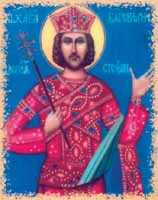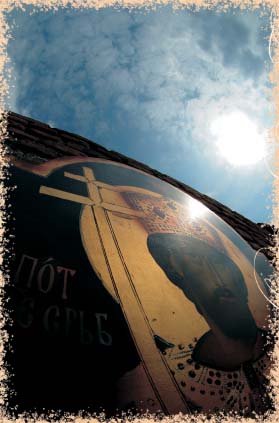|
Destiny has blessed him with a halo of love and blessed him to
disseminate that love around him. Stefan-son of the most
honorable noble Lazar and the most respectful noble Militza,
their sixth child in the order of birth but the very first in
spiritual and martial qualities.
Stefan the lofty.
The awarded name has indicated the nature and features of his
Crown.
Yefimya, a nun of noble origin, in her former, secular life
Yelena Mrnjavchevitch, actually taught him in early childhood
what kind of decisions to take. His education was based on
Alexandrida, a romantic history for the brave. He was a dreamer
and at the same time a ruler who fought duels with history as
challenger, even when the exploit required an effort beyond
human possibilities. Constantine the Philosopher, the author of
his biography, particularly emphasizes Stefan’s ability to very
quickly surpasses his teachers and be perfect in all respects.
He was predestined for his mission of a ruler. He learnt his first
lesson in the meaning of life in Saray, where he took his very
young sister Olivera, sacrificed to the wild warrior and erotic
beast Bayazit – the Thunder. In
predestined for his mission of a ruler. He learnt his first
lesson in the meaning of life in Saray, where he took his very
young sister Olivera, sacrificed to the wild warrior and erotic
beast Bayazit – the Thunder. In
the battle of Angora (Ankara) in 1402, Stefan was at the head of
the undefeated heavily armored right wing. The defeat in that
battle meant for Bayazit shame of slavery and for Stefan the
beginning of a new life. The Byzantine court awards him the
title of Despot.
The Despot insisted on fostering the martial arts and skills in
military tactics. He himself trained his commanding officers and
soldiers. His main personal qualities were his great love for
people and his soldiers and
generosity in charity. Reading sacred books was his main
spiritual preoccupation, but he was fully aware of the
difference between humanism and self defense.
He founded the Order of Knights “Ordo Redis” (Order of Orders)
whose members were crowned heads only. He was the first in the
“Order of the Dragon”, whose members, among other knights, were
Milosh Obilitch, Despot Djurdje Brankovitch, Despot Vuk
Grgurevitch, the Byzantine Emperor Constantine XI, Duke Vlad
Drakula… Many heroes from these lands dreamed of being ordained
knight by Despot Stefan himself and of being given the
opportunity to serve him.
On the wings of his independent authority in 1404 Stefan
Lazarevitch made an agreement with the Hungarian King Zigmund
and was granted the right to spread his authority over Machva,
Belgrade, Valjevo and
 Sokol,
and in 1411 to exploit the mines of Nadzbanja and Felshebanj. Sokol,
and in 1411 to exploit the mines of Nadzbanja and Felshebanj.
His glassy look from the terrace of his Belgrade fortress was well
known all over Europe of that time. Such a unique view was
second to none. As if the smell of freedom prevailed in the air
around the massive towers in the Upper Town. By his Charter the
Despot dedicated Belgrade to the Holy Mother and put it under
her auspices and protection. His majestic court was designed
according to very high Byzantine standards. But his heart was in
pain. He had no heir from his wedlock with Yelena Gamiluzi. He
had a bad fall from the horse, which prevented him from being a
father...
Life follows its usual course and his office operates on the
models of the Byzantine Empire and Venice. He abundantly
exchanges letters with the most powerful dynasties in Europe.
Wars and trade alternate. A time of peace alternates with a time
of fierce battles. The Despot’s mother, noble and respectful
Princess Militza, at that time nun Yevrosima, died in November
1405 and was buried in her memorial monastery Lubostinja. The
Despot starts building the monastery Manasya a mystical
subterfuge combining the features of a monastery and a fortress.
The works are entrusted to the best builders of that time. Thus
Serbia obtained its Camelot and its Athos.

Despot Stefan enjoyed the reputation of a smart man able to see
much farther than people of his time. But the nobility had
different ideas. They did not like his unswerving confidence in
the Hungarians and his openness to foreign customs and foreign
culture. Vuk Lazarevitch was at the head of dissatisfied
nobility, and particularly irritated by his Order of the Dragon,
which he was wearing with pride, because of “some courtesy
commitments to the Catholic Church”.
Serbia becomes victim of the civil war, Sultan Suleiman is
triumphing. Zigmund is on the side of Stefan, Suleiman on the
side of Vuk. The usual Serbia drama beyond rational
understanding. In the moments of his great suffering Despot
Stefan writes his “Slovo ljubve” (Ode to Love). In that same
1409 year he sends a message to his brother Vuk promising to
forgive him, in spite of the war. He meant it seriously and
honestly. Later on, when the Turkish Heir to the Throne wanted
to execute Vuk because of his infidelity, Despot Stefan proved a
great love for his brother by saying: “If I am infidel so is
he.” Love has generously overshadowed the truth.
On Stefan’s request Vuk crossed to Suleiman, the winner in this
conflict. It was Stefan’s magnificent gesture. On the
battlefield he was a hero, like in the battle of Angora, and in
brotherly love always generous. As a tolerant ruler Stefan
embodied Byzantine loftiness and devotion to the nearest and
dearest. The living embodiment of his “Ode to love” (Slovo
ljubve).
It is only in 1413 that Despot Stefan could close the book of
permanent conflicts with the versatile Musa, (who by deceit
killed his brother and rival Suleiman). On that occasion the
Despot displayed his great talent for military diplomacy
characteristic of the greatest among the Knights. Thanks to that
he enjoyed ten forthcoming years of peace. Just sufficient
time to see monastery Manasya completed, to consolidate the
frontiers of his state and hand it over to Djuradj Brankovitch,
his heir, in a well organized shape.
He died quite unexpectedly, on July 19, 1427, on the day when a
thundering storm was raging over Belgrade and thick black clouds
covering its sky, deafening the Despot’s last plea: “Bring
Djurdje, bring
him!”. People deplored the deathof Despot Stefan as if it were
the Doomsday, tearing off their hair and cutting their horses’
manes.
Actually, people deplored the bereavement, the death of their
beloved Dragon, apprehending future developments, aware that he
was the predestined herald of a new age.
A descendent of the Nemanjitch family, son of Emperor Lazar, the
Loft y Despot, like a guardian, he remained a testimony of the
strength of faith and devotion to the oath of chivalry taken by
his Christ loving people, in the most difficult times in history
– at the time of the collapse of the Serbia state and loss of
identity.
The Serbs, unfortunately, mostly remember heroes by their single
exploit – which overshadows everything done before, good or
evil. This approach leads to hasty conclusions, most often
relegating to undeserved oblivion all other heroic acts or sins.
This raises the question: “And what
about the rarest among our forefathers? What about the princes
and knights of unswerving valor, loftiness and kindness – the
ones whose every move in life deserves admiration and gratitude
of their descendents?”
Unusual and deplorable is their destiny, made up of intertwined
secrets and strange omens. “In drinking he was not a drunkard,
he never pushed things to the extreme, nor did he kill anyone by
cutting him from the waist up to the white neck.” If before the
mirror of eternity we ask what kind of a man Stefan raelly was,
the answer is only one, coming by itself: He was a ruler. A
knight. A poet. A valorous hero.
A founder of a monastery. A martyr.
A true God blessed saint.
|

